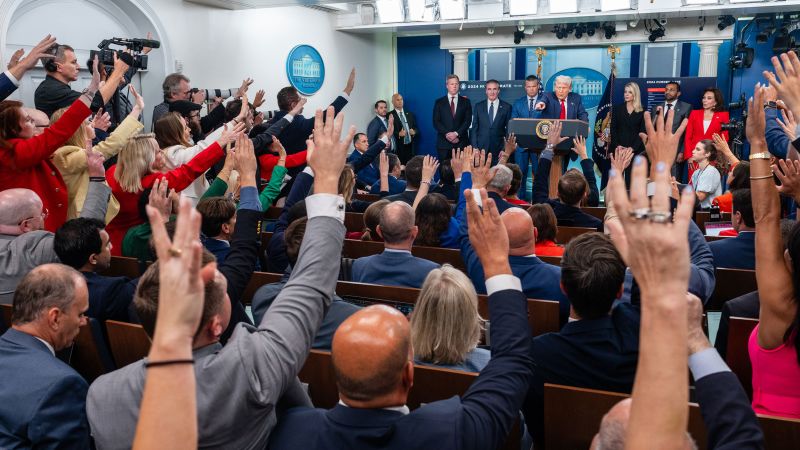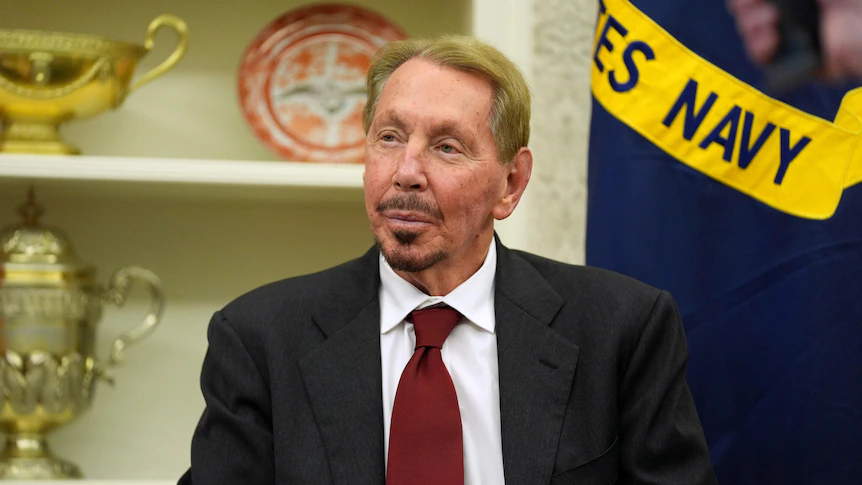
A version of this story will appear in CNN Business’ Nightcap newsletter. To get it in your inbox, sign up for free here.
Growing up in Missouri, the home state of Rush Limbaugh, I often heard the word “media” spoken with a fair bit of derision, sandwiched by the words “liberal” and “bias.” It was an accusation that crystallized as a capital-T Truth for much of the country as Fox News emerged in the late 90s, wielding it as a cudgel to reinforce the network’s conservative credentials.
The perception of “liberal” media was always exaggerated, and often unfair, rooted partly in the fact that most mass media giants were headquartered in Democratic strongholds like DC and New York (where, of course, Fox is also based.)
But President Donald Trump’s MAGA coalition are done crying about perceived bias. Even “fake news” has lost its bite. In his second term, Trump is taking his complaints straight to the source, siccing lawyers and regulators on outlets he sees as a threat (the New York Times, NPR), or allowing his billionaire supporters to wrest control of those he thinks he can jostle into compliance (CBS, Nexstar).
The media industry now finds itself grappling simultaneously with the forces of economics that have been hollowing it out for a quarter-century and the forces of a political movement bent on silencing its critics.
So far, efforts at appeasing the MAGA outrage machine have only backfired. The supposedly “liberal” networks ABC and CBS have each paid millions of dollars to avoid a legal battle with Trump, only to find he wasn’t done making demands of them. After ABC yanked Jimmy Kimmel’s late-night show in response to a threat from Trump’s FCC attack dog, Trump said NBC should follow suit. The president also stated that he believes he should be able to pull networks’ licenses if they air overwhelmingly negative coverage of him — rhetoric that even Republican Senator Ted Cruz called “dangerous as hell” and compared to “mafioso” tactics.
This week, as Jimmy Kimmel’s suspension from ABC rattled the halls of corporate media from Manhattan to Hollywood, I reached out to the journalist and media critic Jeff Jarvis to talk about the attacks on mass media, the business of doing journalism in the internet age, and why the trope of “liberal media” is now firmly a relic of a simpler time.
The following interview has been edited for length and clarity.
CNN: What a head-spinning day. You were on CNN earlier talking about the desiccation of mass media making a political takeover possible, and I wondered if you could elaborate on that.
Jeff Jarvis: We are seeing a frightening usurpation of media by Trump and his allies in the country. Larry and David Ellison, father and son, have now taken over Viacom and CBS alongside Paramount, and we see what they’ve already done with CBS in preparation for that deal — CBS settled a nonsense lawsuit … The producer of “60 Minutes” quit. (Note: the settlement and the shakeup at “60 Minutes” took place before David Ellison’s Skydance Media acquired CBS parent Paramount, though both events were widely seen as preconditions to getting a deal done.)
The word is they’re going to hire so-called “heterodox” writer Bari Weiss for a major role at CBS. They hired a conservative as ombudsman.
So the path of what they’re doing is already clear.
And on top of that, (the Ellisons) are doing a sweetheart deal, by all accounts, to take over TikTok, alongside Marc Andreessen. (Note: Sources tell CNN the TikTok deal Trump announced Friday would involve investments from several US-based firms, including Oracle, co-founded by Trump ally Larry Ellison, and Andreesen Horowitz, a prominent pro-Trump VC firm) .
And that troubles me greatly as well, because TikTok was a potential alternative to old mass media.
So it’s a tremendous consolidation, but it’s not just a business consolidation — it’s a political consolidation of media now at the higher level.
I believe that mass media are dead and dying… So on the one hand, the Trumpist MAGA is taking over a dying institution.
But that doesn’t matter to them, because it still makes their point, and it means that that any dissenting voices have to find places elsewhere. We still have blogs, but they aren’t what they used to be, right? We had TikTok, but that could be taken over. We have YouTube, but that’s also owned by a big corporation that will come under pressure shortly. So it’s really troubling to see where any dissent can be heard in this country anymore.
How’s that for cheery?
CNN: So uplifting, thank you.
Jarvis: The thing I didn’t say (Wednesday) night, is that I think we can, once and for all, end the trope of “liberal media.” There are liberals in media, but the corporations are now either controlled by the right wing or frightened of it.
CNN: It’s also worrying to me because people who work in media, myself included, tend to have deeply held beliefs around the work — the ethics of it, being fundamental to democracy, etc. But it does seem those values are just clashing with economics of today’s media.
Jarvis: The economics of media were built around controlling scarcity… The content became the candy to draw the audience, and the audience’s attention was the real product — and that has been the business model of mass media.
Then the internet ruined the joke, because you no longer could argue that you had the vast attention of America.
We were fooling ourselves for many, many years, since the internet, that we could somehow save what was dependent upon the myth of mass media. That myth, as I always teach my students, is that all readers see all ads, so we charge all advertisers for all readers, that we control their attention. That was never really true, but advertisers had nowhere else to go.
Now advertising has fallen off as a support. Instead, we have much of media going to paywalls and subscriptions, but there’s only so many things people are going to subscribe to, and what that does is put reliable, credible, authoritative information behind paywalls for the few who choose to pay for it.
Big old media has sacrificed its own influence.
CNN: I’m not sure ABC’s appeasement is the right approach, but I also don’t know what the alternative is. Is there, to your mind, a business case for fighting back? Capitulating doesn’t get Trump off your back, so is the only alternative to lawyer up and prepare to lose money? That’s not a very compelling case for the CEO.
Jarvis: I think you’re hitting on two important things: The confluence here of the business pressure with the political pressure means that it’s hard to say “’I’m going to build a new mass medium,” right? That’s not going to work from the business perspective.
What has to happen is that dissent becomes emergent in things like podcasts and blogs and voices that still try to be heard on social media and YouTube.
CNN: On the business question, we’re hearing from Republicans, including Trump himself, saying ‘oh this is isn’t censorship, these networks are just making a business decision’ when canceling someone like Stephen Colbert or Jimmy Kimmel. What do you make of that argument?
Jarvis: It’s a a red herring. If Colbert was losing money, why was he renewed the last time? Why wasn’t Kimmel canceled before?
The business of linear television is tough, true, but… you could make Colbert or Kimmel very inexpensively if the network wanted to make it profitable.
It’s not a business decision. It was a political decision, full stop.



